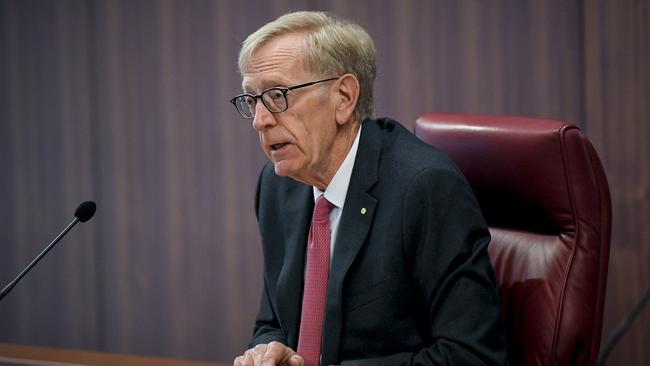Royal commission: Banks scramble to meet response deadline
The major banks are wearing bruises from their first public encounter with the Hayne royal commission.

The major banks are wearing bruises from their first public encounter with the Hayne royal commission, and were scrambling Monday night to meet a deadline of 4pm Tuesday for responses to further issues identified in their 50-page confession statements.
A testy Ken Hayne targeted an unnamed, large institution for requesting an extension of time to answer additional questions in relation to misconduct over the past five years when the original request almost two months ago covered a 10-year period.
That institution is understood to be Commonwealth Bank, which its rivals will privately say is almost single-handedly responsible for the inquiry after a long sequence of poor conduct and misbehaviour.
As of last night, only ANZ Bank was certain to meet the deadline. It, too, had to clarify some points in its original submission, but the Melbourne lender won’t be asking for more time.
Westpac and National Australia Bank are less confident of lodging all the required information and CBA, the laggard, is asking for an extra day or two.
While the banks’ rapid response teams are under enormous pressure to meet deadlines and respond to issues as they arise, it beggars belief that the industry has been unable to get its act together since December 15 when Hayne first asked for the statements.
Hayne appeared deeply unimpressed with the situation.
The banks will also learn from bitter experience that the royal commission is a heaven-sent opportunity for rivals to start coming at them from all angles: the aggro was kicked off by the peer-to-peer lending industry.
P2P lender RateSetter highlighted that the 11.52 per cent average spread between interest rates on consumer lending and the cash rate is its widest since 2004.
This is despite the banks’ cost of funds, based on deposits and the Reserve Bank’s overnight cash market, plunging to a historic low.
The spread between retail deposit rates and standard credit card interest rates for the big four is even bigger, averaging 19.9 per cent. Asked for the three main themes in the opening addresses from Hayne and counsel assisting Rowena Orr QC, a senior banker remarked: “Lending, lending and lending.”
It’s hard to disagree.
There’s no other issue in banking that so excites Canberra, or illustrates the extent of the major banks’ market power in terms of consequence-free repricing of loans and the power imbalance between lender and borrower.
So it was no surprise on Monday when Orr revealed that the first round of hearings, to start in about a month, would focus on consumer lending, including the $1.7 trillion home-loan market, car loans, and the $52.2 billion credit card industry. She said that, of the 385 public submissions received by the commission so far, 49 per cent related to banking.
Personal finance was the dominant category of the complaints, amounting to 31 per cent.
In case there’s any doubt where the commission is heading with this, its terms of reference specify that all Australians have the right to be treated honestly and fairly in their dealings with providers of banking and financial services.
Orr flagged the commission will hear evidence that financial services customers have been short-changed on fairness.
“Some of these events may have involved breaches of the law, while others may have involved departures from community standards and expectations,” she said.
“Each of these events give rise to important questions for consideration by the commission, not least of which are how and why were such events permitted to occur, and what steps, if any, were taken at the time or have since been taken in response to those events, including steps to ensure they do not recur.”
Hayne is no bleeding heart and is not going to allow the commission to be sidetracked by hearing and re-litigating hundreds of customer complaints.
He stressed that the inquiry will proceed with reference to case studies, identifying the kind of misconduct that has occurred, why it occurred, what should have been the response and what follows from the conclusions.
As heartbreaking as some cases will no doubt be, there is simply not enough time to examine them all.
Hayne is looking for general principles and is not going to be diverted by the minutiae.
Public hearings are time-consuming, so the commission is going to do a lot of its work behind the scenes.
Orr said there would be a number of research papers produced over the course of the year. Some will be examinations of sectors or markets within the financial services industry, while others might canvass regulatory structures, policy and law reform.
No comment will be sought for the “purely factual” papers.
It was also abundantly clear that Hayne will run the commission with an iron fist. He emphasised he has his own deadlines to meet — an interim report by September 30 this year and a final report no later than February 1 next year. It’s a tight schedule and, unlike the banks, Hayne clearly has no intention of asking his political masters for an extension.
gluyasr@theaustralian.com.au
Twitter: @Gluyasr


